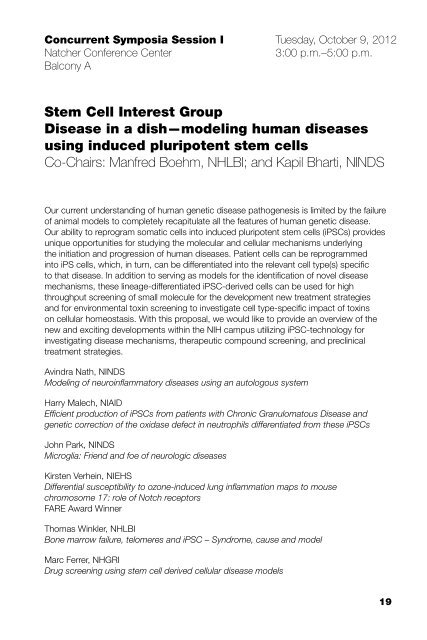NIH Research Festival 2012 Program - Research Festival - National ...
NIH Research Festival 2012 Program - Research Festival - National ...
NIH Research Festival 2012 Program - Research Festival - National ...
You also want an ePaper? Increase the reach of your titles
YUMPU automatically turns print PDFs into web optimized ePapers that Google loves.
Concurrent Symposia Session I<br />
Natcher Conference Center<br />
Balcony A<br />
Stem Cell Interest Group<br />
Disease in a dish—modeling human diseases<br />
using induced pluripotent stem cells<br />
Co-Chairs: Manfred Boehm, NHLBI; and Kapil Bharti, NINDS<br />
Our current understanding of human genetic disease pathogenesis is limited by the failure<br />
of animal models to completely recapitulate all the features of human genetic disease.<br />
Our ability to reprogram somatic cells into induced pluripotent stem cells (iPSCs) provides<br />
unique opportunities for studying the molecular and cellular mechanisms underlying<br />
the initiation and progression of human diseases. Patient cells can be reprogrammed<br />
into iPS cells, which, in turn, can be differentiated into the relevant cell type(s) specific<br />
to that disease. In addition to serving as models for the identification of novel disease<br />
mechanisms, these lineage-differentiated iPSC-derived cells can be used for high<br />
throughput screening of small molecule for the development new treatment strategies<br />
and for environmental toxin screening to investigate cell type-specific impact of toxins<br />
on cellular homeostasis. With this proposal, we would like to provide an overview of the<br />
new and exciting developments within the <strong>NIH</strong> campus utilizing iPSC-technology for<br />
investigating disease mechanisms, therapeutic compound screening, and preclinical<br />
treatment strategies.<br />
Avindra Nath, NINDS<br />
Modeling of neuroinflammatory diseases using an autologous system<br />
Harry Malech, NIAID<br />
Efficient production of iPSCs from patients with Chronic Granulomatous Disease and<br />
genetic correction of the oxidase defect in neutrophils differentiated from these iPSCs<br />
John Park, NINDS<br />
Microglia: Friend and foe of neurologic diseases<br />
Kirsten Verhein, NIEHS<br />
Differential susceptibility to ozone-induced lung inflammation maps to mouse<br />
chromosome 17: role of Notch receptors<br />
FARE Award Winner<br />
Thomas Winkler, NHLBI<br />
Bone marrow failure, telomeres and iPSC – Syndrome, cause and model<br />
Marc Ferrer, NHGRI<br />
Drug screening using stem cell derived cellular disease models<br />
Tuesday, October 9, <strong>2012</strong><br />
3:00 p.m.–5:00 p.m.<br />
19



